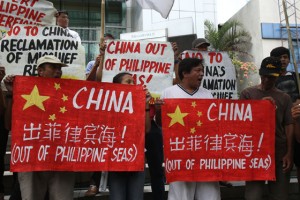The G7 Foreign Ministers’ Declaration on Maritime Security has lashed at China’s “unilateral actions, such as large-scale reclamation[s]” in the West Philippine Sea (South China Sea) that are carried out with apparent aggression.
In its April 15 declaration, the G7 or Group of 7--Canada, France, Germany, Italy, Japan, the United Kingdom and the United States—said it continues to observe the situation in the East China Sea and the South China Sea.
It expressed particular concern about Beijing’s supposedly one-sided moves, which “change the status quo and increase increase tensions.”
“We strongly oppose any attempt to assert territorial or maritime claims through the use of intimidation, coercion or force,” the declaration said.
It pushed for amicable resolution of territorial rows in contested waters.
“We call on all states to pursue the peaceful management or settlement of maritime disputes in accordance with international law, including through internationally recognized legal dispute settlement mechanisms, and to fully implement any decisions rendered by the relevant courts and tribunals which are binding on them,” according to the declaration.
The Philippines, Vietnam, Malaysia, Brunei Darussalam, Taiwan and China have competing claims in the South China Sea while Japan and China have territorial disputes over small uninhabited islands in the East China Sea.
The Philippines, in January 2013, filed an arbitration case against Beijing’s excessive nine-dash line claim before the UN-backed International Tribunal on the Law of the Sea (Itlos).
China refused to participate in the arbitration, which has no implementing mechanism.
But the Philippines said China must prove its status as a global power by following the UN decision.
“We underline the importance of coastal states refraining from unilateral actions that cause permanent physical change to the marine environment in areas pending final delimitation,” the G7 declaration, issued in Lubeck, Germany, stated.
It also expressed its support for full and effective implementation of the Declaration of Conduct (DOC), as well as an “acceleration of work” on a comprehensive Code of Conduct (COC), in the South China Sea.
The Philippines’ Department of Foreign Affairs (DFA), in a statement, on Friday said the G7 Foreign Ministers’ Declaration on Maritime Security highlighted the international community’s commitment to uphold principles of international law, particularly the 1982 United Nations Convention on the Law of the Sea (Unclos), which was the foundation of Manila’s claims in the resource-rich waters.
The Unclos, according to the department, underpins “the stable maritime code that serves
our common interests.”
“The Philippines reiterates its call for a stop to unilateral actions that violate the 2002 Asean-China Declaration on the Conduct of Parties in the South China Sea and international law,” the DFA statement said.
“Such actions undermine efforts to pursue the peaceful, rules-based resolution of the disputes in the South China Sea and to promote regional stability,” it added.


